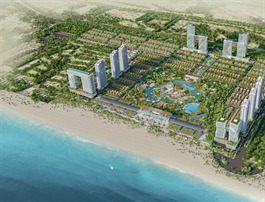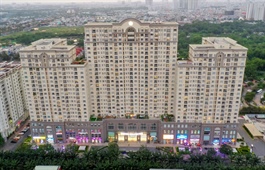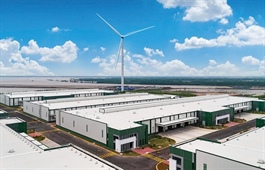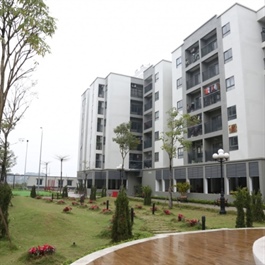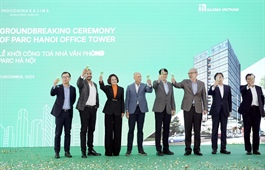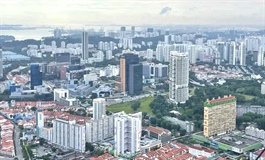Rising house prices putting buyers off
Rising house prices putting buyers off
At the 'Real Estate 2025' seminar jointly organised by the Ho Chi Minh City Business Association and VTV Digital on December 18, experts discussed how to control the ongoing hike in housing prices.
According to the Ministry of Construction, compared to the first quarter of last year, the selling price of Hanoi apartments in the fourth quarter of this year has increased by 58 per cent. Ho Chi Minh City apartments have increased by 17 per cent in that time.
Currently, the average selling price of apartments in Hanoi is VND61 million ($2,540) per square metre, and VND55 million ($2,290) in Ho Chi Minh City.
|
Speaking at the event in Ho Chi Minh City, economist Dinh The Hien said house prices have been increasing for many years, exceeding people's ability to pay. However, no one now has yet been able to find a way to bring prices down.
"Real estate prices are increasing rapidly, putting the opportunity to own a home unreachable for most people, especially in key economic centres like Hanoi and Ho Chi Minh City," said Hien.
In 2012-2013, the price of mid-range apartments in Ho Chi Minh City was around VND22-25 million ($916 to $1,040) per sq.m, high-end apartments were about VND30 million ($1,250) per sq.m, while the average salary of an office worker was VND20 million ($833) per month.
However, over the past decade, the price of mid-range apartments has hit VND50-65 million ($2,080 to $2,700) per sq.m, but the average salary has only increased slightly to around VND25 million ($1,040) per month.
Hien explained that while the economy is recovering, particularly in manufacturing and the business services sector, cash flow for real estate still faces many challenges.
"Banks are hesitant to disburse new capital to real estate businesses due to the high risks, while developers have a serious lack of capital. Many companies on the stock exchange recorded negative cash flow, putting a lot of pressure on the entire market," said Hien.
Meanwhile, Duong Thuy Dung, executive director of property consultant CBRE Vietnam, said that there is no reason for investors to reduce prices.
"This is a difficult question and a huge challenge for the market. Because looking at the current supply, 80 per cent are high-end, luxury apartments and prices of this segment will increase steadily by 8-10 per cent per year," Dung said.
To reduce real estate prices, Dung recommended promoting decentralisation and expanding urban areas.
"While apartments in Ho Chi Minh City's central business districts can be priced at VND150-200 million ($6,250 to $8,300) per sq.m, suburban areas are around VND40-50 million ($1,660 to $2,080) per sq.m. Therefore, if people are willing to travel further, they can find lower prices. This will be a more suitable solution in the next 5–10 years when transport infrastructure is improved," Dung said.
Nguyen Duc Lenh, deputy director of the State Bank of Ho Chi Minh City Branch, said that real estate credit activities for the purpose of use and consumption have a high growth rate.
"Real estate credit has been growing to meet needs, especially for social housing. Residential housing loans account for about 70 per cent of total real estate credit and have returned to positive growth in recent months," Lenh said.
By the end of October, the total outstanding loans for buying houses to live in, repairing houses, transferring land use rights and building houses for residences in Ho Chi Minh City reached VND784 trillion ($32.6 million).
"This reflects positive change for the real estate market while affirming the banking industry's ability to meet the needs of consumers," Lenh added.
According to data from CBRE Vietnam, in 2011-2012, the supply of new apartments in both Ho Chi Minh City and Hanoi decreased, to about 15,000-17,000 units, selling prices also decreased by 7 to 10 per cent. The market witnessed a sharp decline in apartment selling prices. This was at a time when interest rates were as high as 15-17 per cent per year.
In 2013-2014, the market recovered and supply increased. The number of new apartments offered for sale increased to 20,000 units, then 30,000-40,000 units, reaching a peak of 80,000 units in 2016. At this time, macroeconomic indicators positively supported the market, loan interest rates were low, and buyers benefited from those factors.
The market has seen a lot of change since then, with approximately just 30,000 apartments launched this year, with 80 per cent of those in Hanoi.
The market is expected to see about 35,000-40,000 apartments launched in 2025. This suggests that we may be on the cusp of a recovery, but it will take a long time to return to peak levels.
Pham Dang Ho, head of the Housing Development and Real Estate Market under Ho Chi Minh City Department of Construction, said that the real estate market in 2024 was slowly recovering.
"Three important laws on land, housing and real estate have been issued, bringing positive impact by limiting legal regulations. Ho Chi Minh City has also seen breakthroughs on many projects which had been delayed for many years," Ho said.
However, Ho also acknowledged that projects that have been cleared of obstacles and had their investment policies approved still need time to complete other legalities before going on sale, perhaps as much as one to two years.
"Despite the new laws solving some key problems, the approval process must still go through many bodies and that takes time. Therefore, in 2025, supply will improve but not too much and the market still needs more time to fully recover," Ho added.




